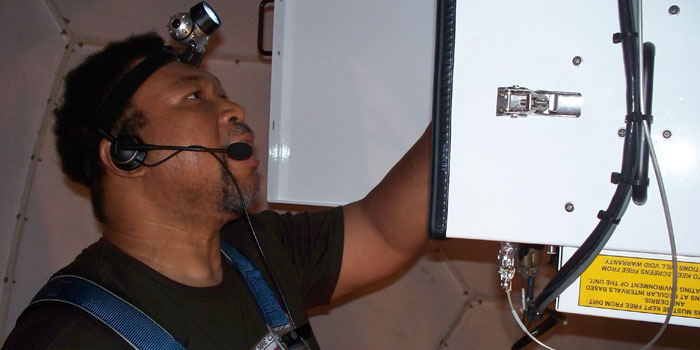Richard Conway: Video Transcript
Hear Richard talk about his job. Download (mp4, 43.6 MB).
Introduction
Hi. My name is Richard Conway. I’m the Chief Electronics Technician on the NOAA Ship Okeanos Explorer.
About Richard’s Job
I’m responsible for all the electronics on the ship that’s non-propulsion related. And there’s five systems on the ship. There’s navigation, communication, scientific, network, and entertainment. And navigation is the radar, GPS, it keeps our location. Communications are the radios, our emergency distress radios, and our phone system. Network is the computers, including the VSAT; VSAT’s considered part of the network. Scientific is our sensors that gather data, our multibeam, our meteorological sensors. And then entertainment is the TV, the VCRs, and the DVD players.
Job Requirements
I travel where the ship is. My normal job involves a rotation, so if the ship was in Hawaii, I would go to Hawaii; if it was on the East Coast, I would go to the East Coast; and if it was up in Alaska, I would go to Alaska. So that’s my travel.
The educational requirements of the job is technical school, on-the-job training, military training, some college is good to have, but basically technical school.
The salary range for this particular job, it starts down as low as $40,000, but you can go up from there depending on what type of job it is, what your responsibilities are, the type of equipment. It’s a supply and demand sort of job.

Learn how a curiousity in science and the ocean led to a fulfilling, sometimes shocking, career that offers opportunities beyond any desk job.
Influences
When I was in high school, there was a little module that went around for some of the low-income high schools and in this module was things about the ocean. And living in the Midwest, I had never seen the ocean, but it left me fascinated about it. So when it came time for me to graduate and they asked me what I wanted to do, and I said, well, I’d like to do something with the ocean.
The person who influenced me the most would have been my mother. She saw that I had an interest in things like that, things, you know, like going to a river or lake and collecting fish and trying to keep them alive and turn them into pets. And even though we couldn’t afford it during the time, she bought a complete set of the encyclopedia from A through Z and then there were some other little references. But that really helped me get my curiosity and interests.
What are the personal rewards?
For me, it’s that everybody’s able to do their job, the scientists are able to get their mission accomplished, the ship’s able to get underway, the crew’s happy. Whenever the VSAT’s down, I’m the first person they come and they look for. Like, for a day, if the VSAT goes down, if I’m in the mess deck, before I get to the rack room where the VSAT controls are, at least six people have told me that the VSAT’s down.
But it’s just that people, just to see the mission accomplished and knowing that, without my equipment running the way it’s supposed to, it can’t be done.
Shocking!
Wow, what’s the most fascinating thing I’ve ever seen and done? Oh, that’s a lot. Actually, it was my Navy career. I was on a submarine and we got hit by a shockwave from an earthquake. That was the most interesting, fascinating…
We were going along at our normal cruising speed and the whole sub came to a complete stop. And it took us a week to figure out what it was that hit us. We thought we had collided with another submarine; couldn’t find another submarine. And the submarine records everything that happens inside the shack, and we went back and we started playing back the tapes and then later as we were going through the tapes, there’s this low-frequency sound and it just completely covers the lower frequencies. And with some other input, we figured out it was a shockwave from an earthquake.
Looking Back
Anything I would have done differently in my education or career? You think about that and then you think, Okay, so if I had to do it over again, I would have gone and become an electronic engineer, but, if I became an electronic engineer, I wouldn’t be here. I wouldn’t be doing this, I wouldn’t be sailing on this ship, I wouldn’t be going to the places I go to, I wouldn’t be seeing the things I see. There’s some satisfaction from designing and things like that, but I would’ve missed out on this whole new experience where you get to see new things that you wouldn’t see sitting in an office or behind a computer screen all day.
Return to profile